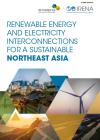

-
-
IRENA and KEEI (2021), Renewable energy and electricity interconnections for a sustainable Northeast Asia, International Renewable Energy Agency, Abu Dhabi.
Copied
/-/media/Files/IRENA/Agency/Publication/2021/May/IRENA_Electricity_Interconnections_NortheastAsia_2021.pdf
Copied
Renewable Energy and Electricity Interconnections for a Sustainable Northeast Asia
Newsletter
In 2020, three of the leading economic powers in Northeast Asia announced ambitious plans to reach net-zero carbon emissions by – or near – the middle of the 21st century, indicating the beginnings of a major transformation in the way energy is produced, traded and consumed throughout the region and beyond.
For China, Japan and the Republic of Korea, achieving this highly significant milestone will require a whole-scale transition from fossil fuel-based electricity generation to new energy systems based on renewables. In this context, regional electricity interconnections can not only support these plans, but also offer additional economic and environmental benefits by promoting renewable energy trade across the region.
This report, a joint study between IRENA and the Korea Energy Economics Institute (KEEI), provides new perspectives on the interconnection potential in Northeast Asia and valuable insights for policy makers and key stakeholders. Informed by three existing regional interconnectivity initiatives, it concludes that renewable electricity development will likely prove a strong motivator for regional interconnection and therefore should comprise the centrepiece of a corresponding multilateral political agenda in Northeast Asia.
The report identifies several positive drivers for electricity interconnectivity in the region that could form the basis for such an agenda – not least the fact that it could lead to new regional electricity market that would offer valuable business opportunities for electricity trading. However, it notes that the region’s existing infrastructure falls short of the requirements of a regional interconnection and will require purpose-built additions using the latest technologies.
Also, in the absence of relevant regional economic cooperation organisations, the study suggests that the Northeast Asia region might benefit from the development of a specialised institution to bridge national and regional interests and take the lead in regional interconnection development.




